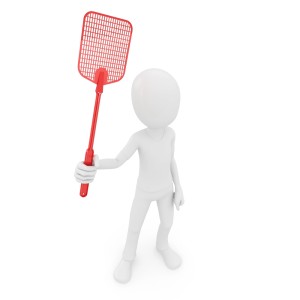Arm Yourself Against Drain Flies!

 Drain flies, also known as sewer flies or moth flies (not moths though), are about the size of gnats and can be quite annoying as they habitually show up in kitchens, bathrooms, and basements. These fuzzy little pests get their name because they lay their eggs (up to 200 of them) in the hair, food, grease, and other organic matter that accumulates within your drain pipes.
Drain flies, also known as sewer flies or moth flies (not moths though), are about the size of gnats and can be quite annoying as they habitually show up in kitchens, bathrooms, and basements. These fuzzy little pests get their name because they lay their eggs (up to 200 of them) in the hair, food, grease, and other organic matter that accumulates within your drain pipes.
If you’re interested in emancipating your drain pipes, the first thing to do is identify the afflicted drains so they can be targeted for treatment. Locate all your floor drains and sump pump openings. Also, look under your sinks and dishwasher, and behind the refrigerator and water heater. Use a flashlight to inspect the inside of your drains for slime or sludge, or use a long screwdriver and lightly scratch the inner drain pipe surfaces, probing for buildup.
The next step is to remove any organic materials collected in the drain. Sorry, but all the drain cleaner in the world will usually not fix the problem. Home remedies like bleach, vinegar, and boiling water will not work either. These treatments may kill the adult flies inhabiting your drains, but will not destroy the breeding grounds. To do this you must physically clean out the drain pipe and any drain covers with a pipe brush. Especially bad clogs may require the use of a plumbing snake to remove clumps of hair or other blockage. Once the buildup is removed, your problem is solved, once the adult drain flies die off that is!
Drain flies can also breed in the soil around leaking sewer pipes and can enter your house through cracks or gaps in the floor slab. If you find yourself in this situation, the leaky pipes should be repaired immediately and the larvae infested soil must be removed.
If you are experiencing drain flies, it is probably worth having the inside of your plumbing visually inspected by a professional with a video camera. Depending on the severity and type of the sludge, you might find that you have serious drainage issues and/or degrading drain lines
